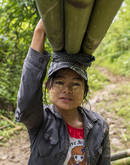Nouvelles

Le processus REDD+ entre dans une nouvelle phase importante. Après des années de préparation, un nombre croissant de pays progressent dans la mise en œuvre des actions REDD + sur le terrain. L'un de ces pays est la République Démocratique du Congo, où la FAO a récemment lancé un projet de quatre ans dans la province de l'Équateur avec le soutien financier du Fonds National REDD+ (FONAREDD).
Le Programme Intégré REDD+ (PIREDD) est réalisé en collaboration avec le Fonds Mondial pour la Nature (WWF) et dans le cadre de la stratégie nationale REDD+ du pays, en s'appuyant sur le soutien fourni...

Reducing emissions from deforestation and forest degradation (REDD+) has great potential to deliver environmental and social benefits beyond the reduction of greenhouse gas emissions. At the same time, such efforts may also bring social and environmental risks. In 2010, Parties to the United Nations Framework Convention on Climate Change (UNFCCC) in Cancún, Mexico, agreed on a set of seven social and environmental safeguards for REDD+ - known as the ‘Cancun safeguards’ to address these risks and promote positive impacts from REDD+. Countries are expected to promote and support these safeguards throughout REDD+ implementation, develop a safeguards information system (SIS) for...

Peatlands cover only 3 percent of the world's surface yet contain as much carbon as all of its vegetation, dramatically underscoring their pivotal role in global climate regulation. Their degradation, by drainage or fire or other forces, triggers their conversion from slow carbon sinks into fast sources capable of releasing carbon stored over millennia in a few decades.
To avoid their degradation and effectively plan their restoration, peatlands should be urgently mapped and monitored.To help member states on this complex task, FAO today launched Peatland mapping and monitoring, a practical publication full of accessible technical information about the world's peatlands and recommendations...

Uganda’s lush tropical jungles, rainforests, savannahs, lakes and rivers are home to an astonishing array of biodiversity. In addition to supporting wildlife, so vital for the country's future heritage and tourist industry, Uganda's forest resources are an essential foundation for the country's climate change commitments as well as livelihoods of forest-dependent communities.
However, these valuable forest resources are disappearing rapidly. According to Uganda’s Forest Reference Level submitted in 2017, deforestation in Uganda is occurring at a rate of 50,147 hectares annually, which creates emissions equivalent to 8,253,982 tons of CO2. If this rate continues unabated, most of the forested area of...

FAO and its partners are delighted to invite you to the online seminar “Peatland mapping and monitoring”. The seminar will present a unique opportunity to exchange ideas with leading experts, launch the recent FAO’s publication “Peatland mapping and monitoring: recommendations and technical overview” and introduce the SEPAL Peatlands Monitoring Module.
Please register here to join the webinar>>
Date: Wednesday, 18 March 2020Time: 9:15-10:45 CET (Rome). Compare time in different time zones here.
Are you passionate about protecting peatlands? Hurry up and book your spot! Due to the limited availability of seats, early registration is strongly recommended.
The session will highlight the importance of peatland mapping and monitoring and...

